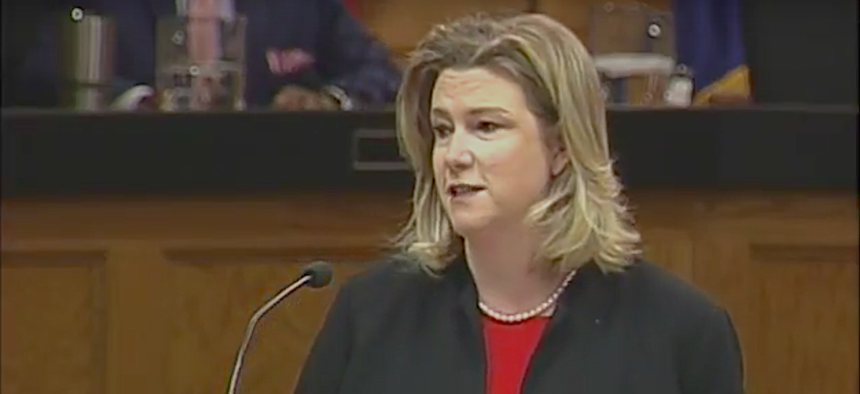Dayton Refuses to Fit the Mold of a City Plagued by the Opioid Epidemic

Dayton, Ohio Mayor Nan Whaley delivers her 2018 State of the City address. City of Dayton / YouTube
Despite leading the nation in accidental overdose deaths, the city is seeing economic growth and launching innovative educational programs, according to Mayor Nan Whaley.
Dayton has the highest numbers of accidental overdose deaths in the nation. However, when the city’s mayor, Nan Whaley, describes what her city looks like today, it is not two-dimensional image the one might expect.
While the opioid crisis is clearly front and center for Whaley and her city, Dayton is successful in ways that bely the national rhetoric and coverage.
For one, the economy is doing quite well.
“We’re seeing really robust job numbers—actually leading the state of Ohio in job numbers in Dayton—and beating the national numbers even sometimes,” Whaley told Route Fifty last week during Civic I/O, the Mayors Summit at SXSW in Austin, Texas. “What we’ve seen is our unemployment rate come way, way down, and basically if you want a job, you can have a job in Dayton right now.”
Whaley was quick to note she is concerned that wages aren’t high enough, and the potential for inflation to stall the economic successes of her citizens and city. Still, it is a bright signal of growth for a city that is considered a central front in a national opioid crisis.
When it comes to the crisis, the city is attempting to address it head on with a mixture of prevention, intervention and enforcement. Dayton was also among the first local governments to sue drug manufacturers for their role in the crisis—for more on Whaley and Dayton’s experience with the crisis, read the key takeaways from our interview below.
However, the city of Dayton has also been able to do big, city-wide programs that go beyond the crisis to other needs. Last year, the Dayton found funding to broaden preschool in a manner that makes it affordable for all residents.
“It’s been really great,” Whaley said. “We really looked to the Denver model, stealing an idea from another city. Denver’s model of the sliding scale is one so everyone can participate, on tuition assistance. So regardless if you’re poor or wealthy there’s something in it for you, but we’ve really put a lot of money into quality.”
Dayton is working with preschools across the city to raise their standards and ensure that every child has the opportunity to go to a quality preschool that prepares them for a life of learning.
“When we tell people Dayton is one of the cities that are pre-school leaders, I think they’re a little surprised and that’s why we love it,” Whaley said.
Watch the full interview or check out our other key takeaways below.
On Suing Drug Manufacturers for Their Role in the Crisis:
“We sued the manufacturers, the distributors, and some of the doctors that were culpable in it back in June,” Whaley told Route Fifty. “We were the number four city. Now there’s over 400 local communities that are part of that.”
She hopes to have the suits settled quickly.
“We’re hopeful for that,” the mayor said. “You know, we want to be very aggressive about it, we want them to be held accountable, because they created quite a mess in our communities and they should pay to clean it up and not just the taxpayers.”
On the Stigma of Addiction:
“The stigma has certainly gone away in Dayton with others because so many people have been dealing with this epidemic in such a very personal way,” Whaley said. “And then, with that, there’s a ‘what’s next’ from the city and from the community, and I think there’s a real interest in that we recognize that this is a disease, it’s not an issue of self-will, and really learning ways that learning how to treat addiction like the health crisis that it is.”
Whaley believes there “definitely” been a culture shift on the epidemic in Dayton.
“I mean, you’re talking about something where literally everyone in our community knows someone. It hasn’t just affected a certain economic group or even racially like other epidemics that have happened. It’s happening to everyone and because of that there’s a more willingness and understanding to recognize that we’ve got to do something and it’s about treating the disease.”
On Leading the Nation in Overdose Deaths:
“That’s a figure I don’t want to be leading in,” Whaley said. “It has affected every part of our community, and everyone in our community knows someone who has struggled with addiction, or has died. I think that has been very tough, obviously, for our families and communities.”
Mitch Herckis is the Senior Director of Programs for Government Executive’s Route Fifty and is based in Washington, D.C.
NEXT STORY: Trump’s Opioid Crisis Looks Similar, Yet Altogether Different From State and Local Experience






